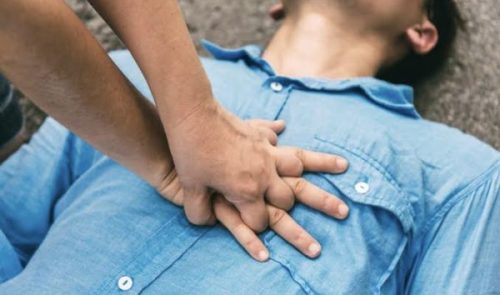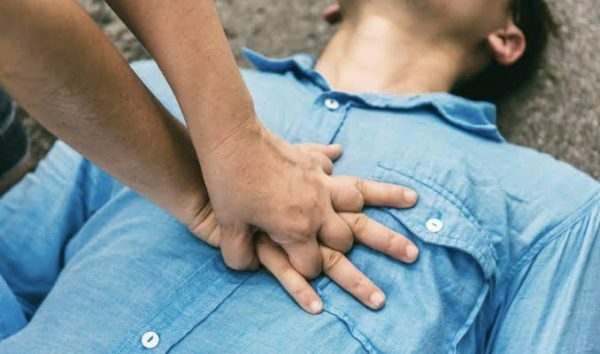
Our heart is one of the toughest organs of our body. Its main function is to pump oxygenated blood throughout the body. A cardiac arrest occurs when the heart stops functioning unexpectedly.
It generally results from an electrical disturbance in the heart, which causes irregular heartbeats. This hampers the pumping action of the heart, stopping the blood flow through the body. A person can lose consciousness and die within minutes if immediate treatment is not given.
What are the symptoms of cardiac arrest?
Cardiac arrest is a sudden and severe condition. It can cause:
- Sudden collapse
- Loss of consciousness
- Loss of breathing
- No heartbeat
Even though cardiac arrest is an unexpected condition, you may experience certain symptoms moments before a complete arrest. The early symptoms are as follows:
- Difficulty in breathing
- Feeling dizzy
- Chest pain
- Nausea and vomiting
When to see a doctor?
You should talk to your doctor immediately if you notice symptoms like difficulty in breathing, chest pain, loss of consciousness, or any of the signs mentioned above.
What are its causes?
Most of the cardiac arrests happen when the electrical system od a diseased heart malfunctions. Such malfunction may cause an abnormal heart rhythm like ventricular fibrillation or ventricular tachycardia. A few cardiac arrests can also be caused by extreme slowing of the heart’s rhythm (also called bradycardia).
Such irregular heartbeats which can cause cardiac arrest, are considered life-threatening arrhythmias.
Other causes of cardiac arrest include:
- Scarring of the heart tissue: This scarring could be due to a prior heart attack or may be another cause. A heart that’s enlarged or scarred from any cause is likely to develop life-threatening ventricular arrhythmias. The first 6 months following a heart attack represents a particularly high-risk period for sudden cardiac arrest in those patients suffering from a atherosclerotic heart disease.
- Cardiomyopathy (a thickened heart muscle): Damage to your heart muscle can be the cause of heart valve disease, high blood pressure, or other causes. An unhealthy heart muscle may make you more prone to a sudden cardiac arrest, especially if you also have heart failure.
- Heart medications: Under some conditions, various heart drugs can set the stage for arrhythmias that may lead to a sudden cardiac arrest. This may look odd but, anti-arrhythmic medications used for the treatment of arrhythmias can sometimes produce ventricular arrhythmias even at normally prescribed doses. This is known as a “proarrhythmic” effect. Major changes in blood levels of magnesium and potassium (from using diuretics, for instance) can also cause life-threatening arrhythmias and cardiac arrest.
- Electrical abnormalities: Certain electrical abnormalities such as Wolff-Parkinson-White syndrome and Long QT syndrome may cause sudden cardiac arrest in children and young people.
- Recreational drug use: Use of some recreational drugs may also cause sudden cardiac arrest, even in otherwise healthy people
- Blood vessel abnormalities: In some rare cases, congenital blood vessel abnormalities, particularly in the aorta or coronary arteries, may lead to cardiac arrest. Often the adrenaline released during intense physical activity acts as a trigger for a sudden cardiac arrest when such abnormalities are present.
Who is at risk for cardiac arrest?
You may be at risk of having a cardiac arrest if you suffer from the following heart conditions:
- Coronary Artery Disease
- Irregular Heart Valves
- Heart Arrhythmia
- Electrical Impulse Problems
- Previous Episode of Heart Attack
Apart from the above-mentioned conditions, there are various other risk factors like
- Age: With increasing age, the risk of a cardiac arrest increases.
- Family history: If anyone in your family has had a history of heart problems, you are at a greater risk.
- Stress: Stress is a major culprit. It is linked to a number of diseases, including cardiac arrests.
- Electrolyte disturbance( electrolytes such as potassium,calcium,magnesium etc)
What are the treatment options available?
The available treatment options include immediate treatment and long term treatment.
Immediate treatment
- CPR: Cardiopulmonary resuscitation (CPR) is needed for treating sudden cardiac arrest immediately.
- Defibrillation: A device is programmed to send an electrical shock to the heart when it detects ventricular defibrillation. This stops the heart momentarily and causes it to go back to its normal rhythm.
